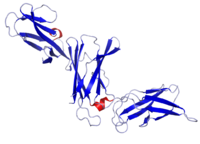
Photo from wikipedia
The objective of the present study is to investigate the mechanism and the cell components of Lactobacillus crispatus KT-11 strain (KT-11) that induce interleukin (IL)-12p40 production. IL-12p40 production induced by… Click to show full abstract
The objective of the present study is to investigate the mechanism and the cell components of Lactobacillus crispatus KT-11 strain (KT-11) that induce interleukin (IL)-12p40 production. IL-12p40 production induced by KT-11 was decreased in the presence of inhibitors of extracellular signal-regulated kinase or nuclear factor kappa B. Guanidine hydrochloride, urea or lithium chloride extract of KT-11 induced IL-12p40 production, but production was suppressed in the presence of Toll-like receptor 2-specific neutralizing antibody. These findings suggest that the protein denature extracts of KT-11 promote IL-12p40 production via Toll-like receptor 2 in J774.1 cells. PRACTICAL APPLICATIONS: Heat-treated lactic acid bacteria are added to some foods because it is easier to store and transport, and have less interference with other food ingredients compared with living lactic acid bacteria. Heat-treated Lactobacillus crispatus KT-11 strain (KT-11) is included in some foods because of good handling characteristics and good dispersibility in the food product. We have previously reported that the administration of KT-11 led to beneficial health effects through the regulation of the immune system in mice, but the mechanism is not clear. We found that protein denature extracts, which may include proteins such as SLP and SLAPs, of KT-11 cells promoted IL-12p40 production via TLR2 in the J774.1 cell culture. This result will contribute to providing more effective lactic acid bacteria functional food.
Journal Title: Journal of food biochemistry
Year Published: 2020
Link to full text (if available)
Share on Social Media: Sign Up to like & get
recommendations!